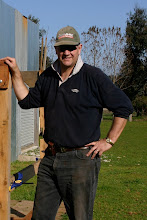We are here because both of my grand fathers fought through this area. They both survived, but my Grandad had an older brother who didn't. Here they are - Harold Lee Spark (Grandad) on the left and Thomas Edwin (known as Eddy) Spark on the right.
Here is what my Grandad said about his brother in a recording made in December 1976:
He was wounded on the Somme, got a bullet through his lungs and they sent him home to Britain to recuperate.
That was the 1st of July 1916, a terrible battle. They kept them back for the Somme, and by Jove mankind are a lot of idiots, fattened them up for all this and then they were only in battle for about half an hour and they were just about all wiped out.
They were saved for the Somme like many other regiments were, and they just got completely cut up. They couldn't face the machine guns. It was the machine guns that did it; they mowed them down in waves just like grass, one wave after another. How the British soldier stood up to it - or any soldier. They just went forward, they had to do it. It mowed them down like grass, it was absolutely amazing, the spirit, the bravery. But that's history. I don't think they'd do it today; in fact I'm sure they wouldn't. But these silly fool had to do it.
... he was wounded on the Somme, got a bullet through his lungs and they sent him home to recuperate. And then the sent him back and got him blown to pieces. He was stretcher bearing, five of them were, and he was absolutely blown to bits, bringing in a wounded officer.
And he's commemorated at Pozieres.
And there he was on the western wall on a list of those lost with no known grave along with hundreds and thousands of others. Perhaps he lies beneath one of the many headstones that say:
A Soldier of the Great War
Known unto God
Perhaps not - perhaps he's just part of the Picardy soil that now grows beautiful crops of wheat, barley, potatoes, rape and sugar beet. Now they would find some DNA and give every one a grave. In the end does it matter?
Eddy was first wounded in the 'big push' at Authuille Wood on 1 July 1916. He didn't go back to the front until the Spring of 1918 - a few weeks later he was killed in action on 28 April of that year. He was 22 years old.
As I read my Grandad's words, I can hear him speaking. Over 50 years in New Zealand didn't dull his northern accent. I knew him well - and spent quite a lot of time with him. He always spoke as though he had a lot to say - and couldn't wait to get it out. And he said things with conviction - or with a twinkle in his eye - and sometimes both together.
Agree, then, about the folly of war. But give the participants their due.
Herbert Fairlie Wood






No comments:
Post a Comment